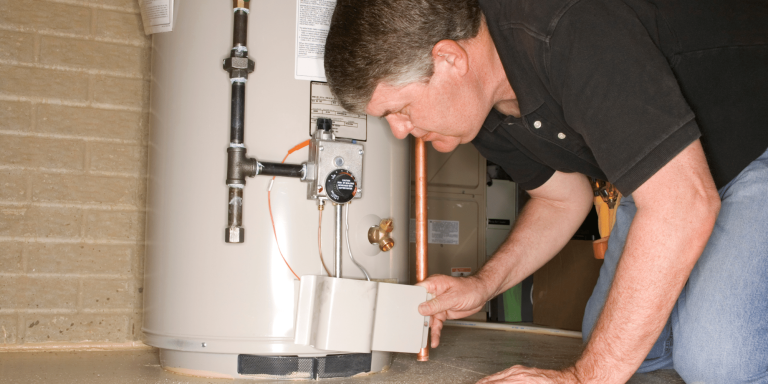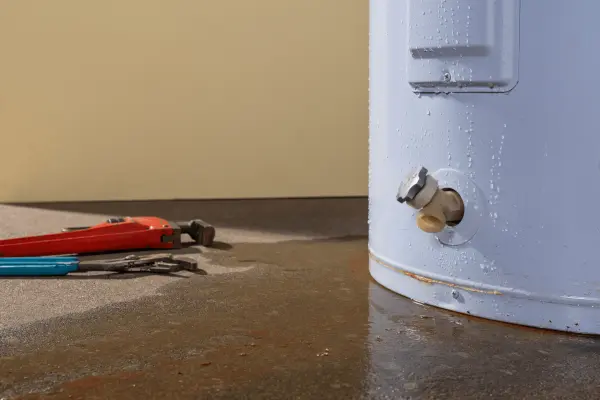You want to take a warm shower. Usually, in a house, there’s a big tank that stores hot water for you to use whenever you need it. This tank keeps the water hot, even when you’re not using it. Now, a tankless water heater is different. It doesn’t store hot water in a big tank. Instead, it heats only when you turn on a faucet or shower. So, when you want hot water, it quickly heats it for you right then and there.
In the quest for more efficient and eco-friendly home appliances, tankless water heaters have emerged as a popular alternative to traditional storage tank heaters. These sleek, space-saving devices provide hot water on demand, which offers few challenges and many benefits. Understanding how tankless water heaters work and how to maintain them is vital for anyone considering making the switch. This guide’ll closely examine tankless water heaters, discuss their pros and cons, and share maintenance tips to ensure your system works well.
Tankless Water Heaters Work
The fundamental principle behind tankless water heaters is only to heat water when needed. There are two primary types of tankless water heaters: those that use gas burners and those that employ electrical resistance heating coils.
1. Gas Tankless Water Heaters:
These devices use a unique burner that uses gas to heat water quickly. When you open a faucet for hot water, cold water goes into the unit, and the burner heats it fast, so you get hot water immediately.
2. Electric Tankless Water Heaters:
Electric models use a heating coil to heat the water as it passes through. They are highly efficient but can require considerable electrical capacity, making them better suited to smaller households.
The most crucial advantage of tankless water heaters is their instant hot water production on demand. Without needing a storage tank, you can enjoy a constant hot water supply without running out, a common concern with conventional heaters. Additionally, tankless water heaters are known for their energy efficiency, as they only heat water when needed, reducing energy waste and utility bills.
Getting Started with a Tankless Water Heater
To get started with a tankless water heater, you also need to calculate the desired flow rate. Different appliances and faucets have different flow rates, and a tankless heater must meet the demand. Proper sizing ensures your unit can provide the hot water you need without issues.
Before you decide, it’s essential to think about the pros and cons of a tankless water heater.
Although they offer many advantages, they may only be suitable for some. You should consider initial costs, installation expenses, and occasional maintenance requirements.
Pros of Tankless Water Heaters

Tankless water heaters have several advantages, making them an attractive option for many homeowners.
1. Space-saving:
The most important advantage is their compact size. Tankless units can be mounted on walls or installed in small spaces, freeing up valuable floor space in your home.
2. Instant Hot Water:
Say goodbye to waiting for water to heat up. Tankless units provide hot water on demand, eliminating the need to store large amounts of hot water in tanks.
3. Control Panel:
Tankless water heaters often have a control panel that allows you to adjust temperature and flow rate settings. This level of control can help you manage your energy bills more effectively.
4. Long Lifespan:
Tankless units generally have a longer lifespan than conventional water heaters. Proper care can last up to 20 years, reducing waste and replacement costs.
Cons of Tankless Water Heaters
Tankless water heaters offer many advantages but also come with challenges.
1. Flow Rate Calculation:
If you don’t get the proper flow rate, you can overwhelm the system, meaning you don’t have enough hot water when needed. Getting this calculation right is essential to ensure your unit meets your needs.
2. Performance Issues:
Tankless units may experience problems such as water line blockage or ignition failure. These problems may require troubleshooting and maintenance.
3. Mineral Buildup:
Areas with hard water can cause mineral deposits in the unit’s heat exchanger, reducing efficiency. Regular maintenance is essential to prevent this problem.
4. Higher Initial Cost:
Tankless water heaters cost more than traditional water heaters. But saving money on your energy bills over a long time might make up for the higher initial cost.
Maintenance and Troubleshooting
Proper maintenance is essential to keep your tankless water heater running smoothly. Here are some tips for maintaining your unit and solving common problems:
1. Water Filters:
Regularly check and replace water filters to prevent sediment and debris clogging unit components.
2. System Overload:
If you notice less hot water when many people use it, it might be because the system is overloaded. You can change how fast the water comes out or consider getting a bigger unit if needed.
3. Blockages:
If the water isn’t flowing well or the heat is uneven, something might block the unit or the water pipes. You can check the manufacturer’s instructions for help or try some DIY solutions. If it’s tricky, it’s okay to call a plumber.
4. Ignition Failure:
Various factors can cause ignition failure, such as gas supply problems or ignition system malfunctions. If you have this problem, it is best to seek professional help.
Conclusion
Tankless water heaters are a remarkable innovation that offers instant hot water and energy efficiency. However, they come with challenges, including proper sizing, maintenance, and occasional troubleshooting. By understanding how a tankless water heater works and following the maintenance tips in this guide, you can consistently enjoy hot water’s benefits while minimizing potential problems. If you ever experience continuous issues with your tankless water heater, don’t hesitate to contact a professional plumber for help. With the proper knowledge and care, your tankless water heater can provide reliable hot water for years.






